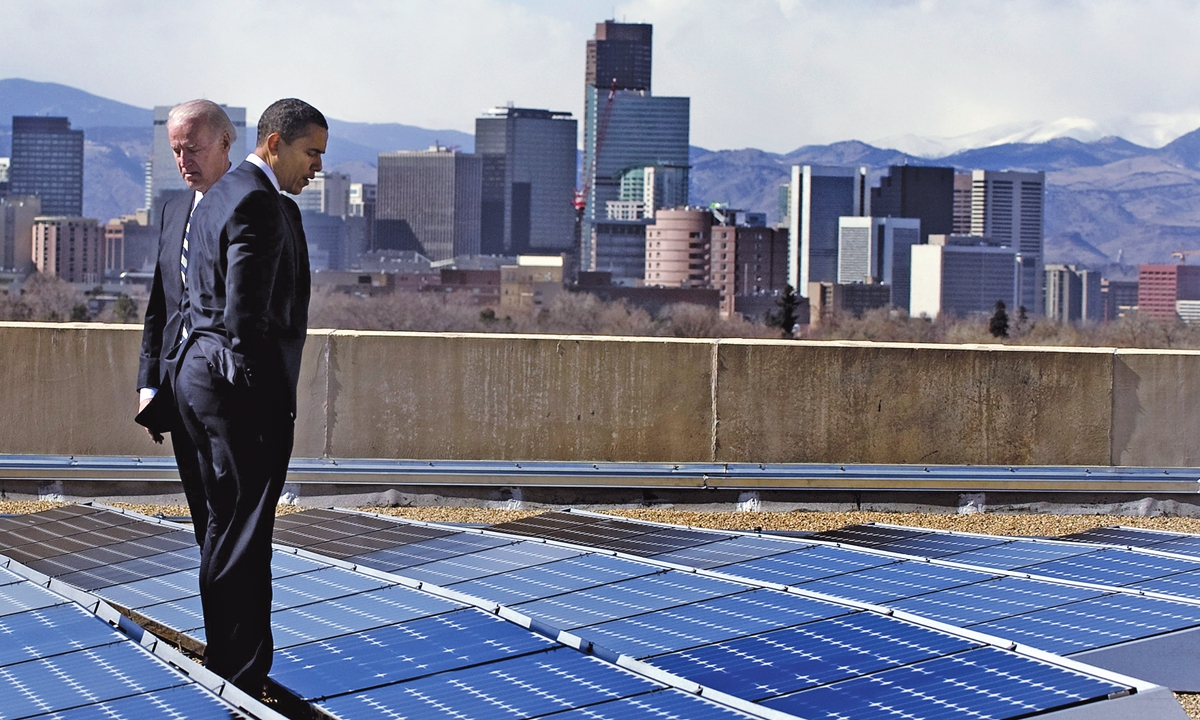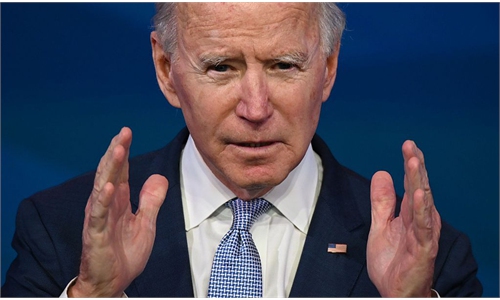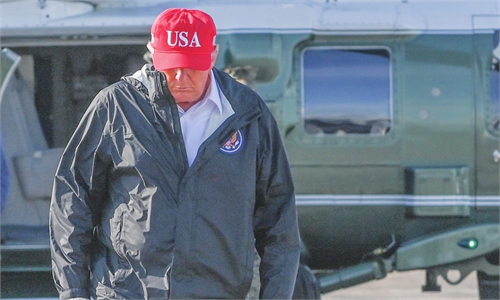
Former US president Barack Obama (right) and then vice president Joe Biden look at solar panels as they tour the solar array at the Denver Museum of Nature and Science in Denver, Colorado, the US, on February 17, 2009. Photo: AFP
Storm clouds are gathering over Washington. The US House of Representatives voted on January 13 to impeach President Donald Trump for allegedly inciting rioters who stormed the Capitol. This turns him the first president in US history to be impeached twice. Some Americans have been voicing threats of more violence, targeting January 20 when Joe Biden will be inaugurated as the new president.The challenges Biden faces are far greater than those of Trump in 2017 when the latter was sworn in.
Fighting COVID-19 will be Biden's priority after he assumes power. This will take up most of his energy in the short term. During the election campaign, Biden promoted his policy initiatives, including respecting science, naming healthcare experts to his advisory board, boosting coronavirus testing, and asking Americans to wear masks and a vaccination blitz.
However, due to the US federal system, where each state has its own individual powers; and due to the bipartisan fight in the US that has become fiercer, the battle against the epidemic is politicized. This is not optimistic for Biden to efficiently carry out his epidemic fight plans, including large-scale vaccinations.
The roots for such a deplorable epidemic crisis in the US will tie Biden's hands to immediately alleviate the problem. The separation of powers, as well as checks and balances, have turned into tools for political games among different interests groups in the US. The impeachment of Trump will consume considerable time of the Senate, influencing the efficiency of Biden's appointments and domestic bills. The fierce disputes on the impeachment will further intensify political infighting, jeopardizing bipartisan consensus on the US crisis at home.
Diplomacy is an extension of internal affairs. When Biden confronts numerous domestic challenges, he will also have to shoulder crucial tasks to prevent the US global image from continuing declining. Before the midterm elections in 2022, Biden will likely keep focusing on the US' own affairs.
But this does not mean that Biden's team has no ambition on foreign policies. Adjusting Trump's "America First" will be an urgent task. In the upcoming two years, the Biden administration will gradually revise the US' foreign policies, including restoring the US image as the "beacon of democracy." It will also reshape ties with US allies and relocate US strategic resources globally.
It is conceivable that if Biden accomplishes little in the first two years and still faces stumbling blocks on the path of promoting domestic policies, showing tough stances toward the outside will become his precedence. By then, the Indo-Pacific region, or even specifically China, will again become the top priority for Biden's global diplomacy.
During Trump's 2020 campaign, he hyped up Biden's image as being weak toward China. And the Trump administration has been intensifying pressure on China before leaving office. As such, Trumpism's hard-line approach to China, as well as the China hawks, may push back Biden if he wants to adjust the current foreign policy. This will also force Biden to keep a distance from the so-called pro-China stances of the Obama era. Biden will thus have to handle the relationship between Trump's legacy and Obama's legacy with a fine balance.
Therefore, no drastic change will be made in the US' China policy right after Biden assumes office. Inaction or slow action may become a more realistic choice for Biden regarding China policies at the beginning of his presidency.
A worse-case scenario: Biden may take some of Trump's policies as the basis of his China focus. This could happen if Biden has trouble pushing domestic initiatives. He thus might adopt a combination of Trumpism and Obamaism in an attempt to win more understanding from hard-liners in the Republican Party to promote his domestic agendas.
This means Biden will likely treat strategic competition as the main axis of his China policy. He might continue to pile pressure on China in order to make the latter give way and change itself. But such an approach will lead the US onto an old path of competition. This will inevitably not redress the US' continued decline.
The author is an assistant research fellow with the Institute of America Studies, China Institutes of Contemporary International Relations. opinion@globaltimes.com.cn



